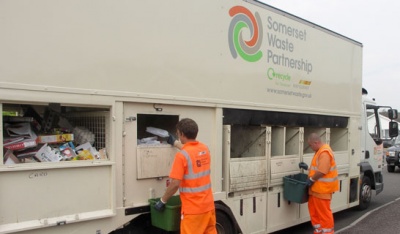Somerset developing three-weekly collection plan
 The Somerset Waste Partnership (SWP) is considering introducing a three-weekly residual waste collection as part of its upcoming business plan.
The Somerset Waste Partnership (SWP) is considering introducing a three-weekly residual waste collection as part of its upcoming business plan.
A draft business plan for 2016-21, which includes measures to reduce the frequency of residual collections and increase the range of recyclable materials taken, was approved by the Somerset Waste Board in December. The SWP is now creating a ‘detailed evaluation’ of the new service model and negotiating changes to its waste services contract with Kier.
The proposed changes would see plastic pots, tubs and trays (PTT), cartons, small electrical items and household batteries added to the weekly recycling of the 245,000 homes served by the partnership.
By collecting more household items for recycling, the SWP hopes to facilitate a less frequent residual waste collection, which it says would ‘save millions’ over the coming years, hold down council tax rises and fund other services.
A recent study carried out by the SWP found that around 50 per cent of the existing average Somerset residual waste bin is made up of food or materials that could already be recycled in the current kerbside collections, while a further 10 per cent could be taken to household waste recycling centres (HWRCs). Landfilling residual waste currently costs the authority £12 million a year.
It says the changes would increase dry material recycling by up to 30 per cent with food waste recycling (also collected weekly) increasing by up to 15 per cent.
 The SWP is the joint partnership between the five Somerset districts (Mendip, Sedgemoor, South Somerset, West Somerset and Taunton Deane) and Somerset County Council. It was the first county-wide area to combine waste services under a single joint committee – the Somerset Waste Board, which consists of two representatives from each of the six councils.
The SWP is the joint partnership between the five Somerset districts (Mendip, Sedgemoor, South Somerset, West Somerset and Taunton Deane) and Somerset County Council. It was the first county-wide area to combine waste services under a single joint committee – the Somerset Waste Board, which consists of two representatives from each of the six councils.
New system development
Trials of the additional material collections were ‘successfully’ carried out in Taunton Deane in 2014. These trials also tested different collection frequencies, involving weekly or fortnightly recycling and fortnightly or three-weekly residual waste collection. The SWP says that the highest performance was achieved on trial rounds with weekly recycling and three-weekly residual waste.
Reports following the trial stated that there were some initial concerns among the 1,200 households in the area where the three-weekly refuse collections were tested, but, once started, most found they coped more easily than expected due to the extra materials collected for recycling.
At the end of the trial, all households were invited to complete a short survey. In the area with enhanced recycling and three-weekly refuse, 86 per cent of respondents said they would prefer to continue with the extra recycling and three-weekly refuse, rather than go back to the previous arrangements (fortnightly refuse collections without the enhanced recycling).
Since the results of the trials were received by the board in June 2015 work has been undertaken to consider a number of issues including the markets for new materials and lessons learned from LAs that have already introduced three-weekly collections. Eunomia Research & Consulting was also commissioned to assess the potential costs and performance of a number of different collection systems.
The board settled on a suggested model of keeping the current kerbside sort collections and adding modified vehicles with additional materials and a three-weekly residual waste collection.
According to the Eunomia investigation, this would increase dry material recycling by 19-30 per cent and food waste recycling by 8-15 per cent. It would also allow savings to be achieved by all SWP partner authorities.
‘Environmental and economic win-win’
A statement release on the SWP website said: ‘With the potential for so much material to be collected for recycling each week, the councils, working through their joint Somerset Waste Partnership (SWP), have been exploring whether the refuse collection frequency could be reduced to three weekly.
‘With food waste continuing to be collected weekly and steps to help families with children in nappies, extensive trials have demonstrated that those who recycle well will manage without problems.
‘Trials of three-weekly collections with the extra recycling achieved significant success, with much more recycled, far less rubbish and an overwhelming majority of those taking part backing the new system.
‘SWP is confident this is a practical, sustainable and cost-effective solution to help residents recycle more, waste less and save money. SWP also hopes that the kerbside collection changes will happen alongside an end to landfilling rubbish in Somerset, with waste processed elsewhere to extract materials or burn it for power.
‘Increased recycling and reduced landfill are an environmental and economic win-win and will help keep Somerset among the top recycling areas in the UK.’
Three-weekly collection
A number of councils have recently trialled three-weekly residual waste collections in an attempt to increase their recycling rates. After two months of a trial scheme in Bury, the council released figures in August 2015 suggesting the kerbside recycling rate had risen by eight per cent. Rochdale Borough Council agreed in July last year to switch permanently to three-weekly collections in a bid to save money and raise its recycling rate of 34.5 per cent.
Powys and Gwynedd have both rolled out three-weekly collection systems in Wales, while the island of Anglesey is also considering introducing such a system as a way of meeting Welsh recycling targets.
In September 2015, the Scottish LA of Fife became the first in Great Britain to trial monthly bin collections across 2,000 homes.
More information on the Somerset Waste Partnership can be found on the authority’s website.





